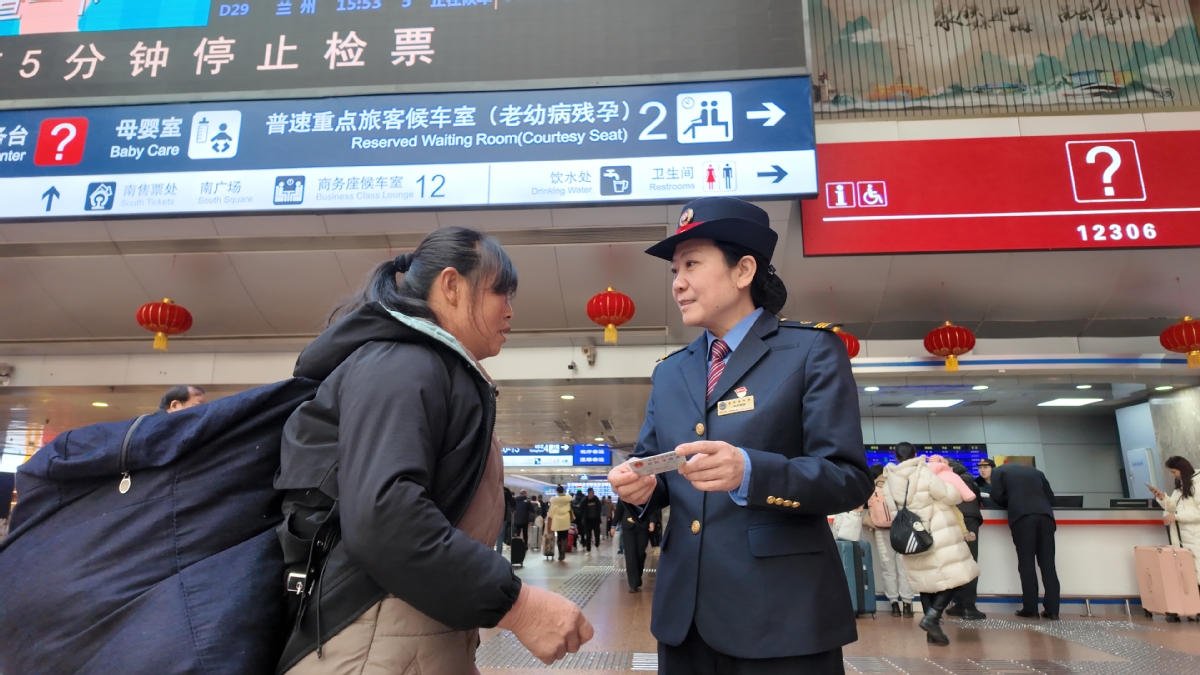
Wang Youni, a stationmaster, answers passenger inquiries at Beijing West Railway Station on Jan 21. Luo Wangshu/China Daily
The world's largest annual human migration — the Spring Festival travel rush in China — came to an end on Saturday. As the curtain fell on this grand spectacle, the railway transportation system once again set multiple records.
For Wang Youni, a stationmaster on duty at Beijing West Railway Station, this travel rush was both ordinary and extraordinary. Ordinary because she had experienced countless travel seasons throughout her career. Extraordinary because it marked her last Spring Festival travel rush before retirement.
A Career Spanning Decades of Change
Wang, 50, has been a steadfast figure in China's railway industry for 29 years. She began her journey in 1996 at the age of 21, working at Beijing South Railway Station for a decade before transferring to Beijing West Railway Station. Now, as the stationmaster on duty at one of China's busiest transportation hubs, Wang oversees critical responsibilities—ensuring smooth passenger flow, handling emergencies and complaints, and coordinating with departments such as ticketing, security, and maintenance.
This year's Spring Festival travel rush, also known as Chunyun, began on Jan 14 and concluded on Saturday. A record-breaking 510 million trips were expected during the 40-day period, with Beijing West Railway Station handling approximately 5.23 million passenger trips, according to Li Chao, deputy head of the station. Amidst this massive migration, Wang's role was indispensable.
On Jan 21, Wang patrolled the station as usual. Walking through the station's lengthy corridors, she was frequently stopped by passengers with a variety of inquiries — from locating waiting rooms to understanding train schedules. No matter how simple or complex the questions, Wang responded with patience and professionalism, embodying the warm service spirit that has defined her career.
Having held various passenger-facing roles over the years, including ticket sales and ticket checking, Wang gained in-depth knowledge of passenger needs. This experience has allowed her to excel in her current role with expertise and empathy.
A Career of Transformation
As China's railway industry rapidly evolved, Wang witnessed remarkable transformations in railway stations. When she first joined the workforce, Beijing South Railway Station was a small-scale facility. However, in 2008, it was revamped into a major transportation hub, serving as the departure point for China's first high-speed railway — the Beijing-Tianjin Intercity High-Speed Train.
Beijing West Railway Station, a long-standing transportation hub, has also undergone significant modernization. "When I first arrived at Beijing West in 2006, the large crowds and high-pressure environment were overwhelming. I had to adjust quickly and strive to provide quality service," Wang recalled. Once a chaotic station with basic facilities, it has since been modernized with new waiting areas, improved signage, and advanced ticketing systems, resembling a modern shopping mall.
Frequent traveler Liu, who regularly commutes between Beijing and Hebei province, noted these improvements. "In the past, Beijing West was outdated, and food options were limited and expensive. Now, with places like McDonald's and Starbucks, prices are nearly the same as outside," Liu said. Wang echoed this sentiment, emphasizing the station's enhanced efficiency and service quality.
The expansion of China's high-speed railway network has fundamentally changed the Spring Festival travel rush. Traditionally, Chunyun was dominated by returning home. However, with rising living standards, tourism has become an increasingly popular choice, bringing a more diverse mix of travelers. It has also brought changes at railway stations.
"Previously, it was easy to distinguish passengers — migrant workers carried heavy bags, and students traveled in groups. Now, people dress better and often send their luggage home in advance," Wang said.
These shifts have also impacted Wang's daily responsibilities. While past complaints mainly focused on train delays and station services, today's travelers often struggle with new digital systems. Helping elderly passengers navigate real-name ticketing and digital services has become an integral part of her work. "It's a challenge, but also an opportunity to improve service quality," Wang said.
A Lifetime on the Rails
During Chunyun, railway staff endure long hours and intense passenger surges. Despite the challenges, Wang and her colleagues remain committed to providing top-notch service. "Our ultimate goal is to ensure every passenger has a safe and pleasant journey home. When we receive praise from passengers, all our hard work feels worthwhile," she said.
As this year's Chunyun concluded, Wang felt a mixture of pride and nostalgia. She was proud to have served billions of passengers over the years but sentimental as she bid farewell to the fast-paced world of railway operations. Looking ahead, she plans to spend more time with her family, particularly her aging parents, and pursue new hobbies such as yoga.
Reflecting on her career, Wang believes that the key to balancing work and family is to be fully present in each role. "At work, I focus on passengers. At home, I try to leave work-related stress behind," she said. Though the job was not what she initially envisioned, she grew to love it. "I'm glad I could help make passengers' journeys a little easier."
Wang also takes pride in having witnessed the extraordinary expansion of China's railway system. Before 2008, China had no high-speed rail. By the end of 2024, the country's railway network had reached 162,000 kilometers, including nearly 48,000 kilometers of high-speed rail, making it the world's largest high-speed railway network. In 2024 alone, China's railways transported 4.08 billion passenger trips, setting a new historical record.
"I'm a fortunate person. I've worked and lived in an era of rapid railway development, and I feel that I've made a small contribution to this progress," she said.